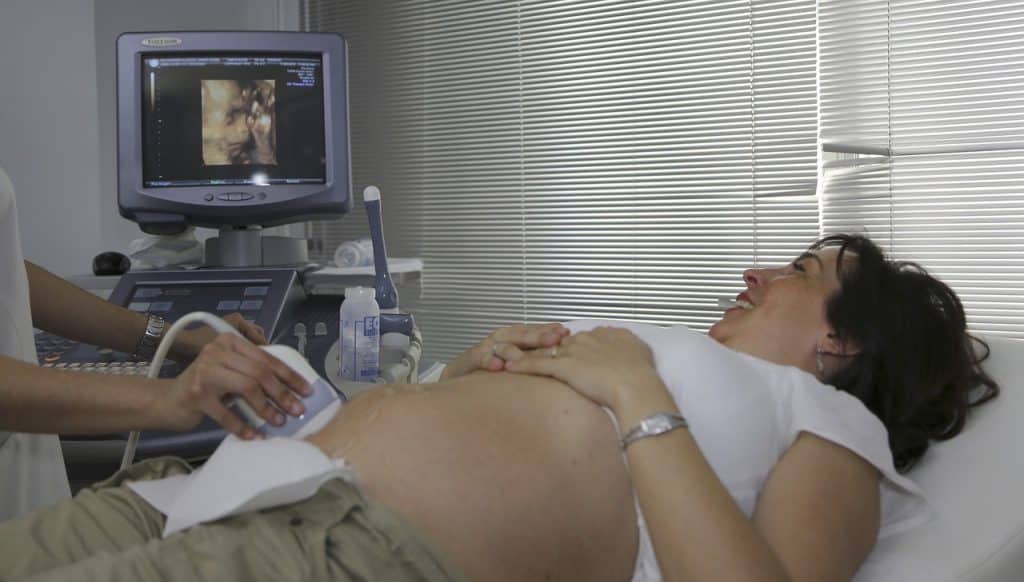One of the things you can do to ascertain you’re on track for a healthy pregnancy is to measure your baby’s heart rate and rhythm. You can do this through internal or external fetal heart monitoring. It’s worth noting that the fetus’s average heart rate changes throughout pregnancy.
Can fetal heartbeat disappear and reappear? Yes, sometimes a fetal heartbeat disappears and reappears, causing mothers extreme worry and confusion. There are several possible reasons for this (e.g., human error during an ultrasound, awkward positioning of the baby, etc.).
Many might hastily conclude that no fetal heartbeat indicates a miscarriage. However, your doctor might not detect an otherwise healthy fetal heartbeat for other reasons. Hence, it’s best to do another ultrasound or ask for a second opinion to confirm the cause.
Can Fetal Heartbeat Disappear and Reappear? (Explained)
1. Type of Ultrasound
Doctors recommend different kinds of ultrasound during pregnancy, depending on the purpose. Some of them are more accurate than others. How many weeks you’re into your pregnancy also affects the accuracy.
One of two primary types of ultrasound during pregnancy is the transvaginal ultrasound, which involves placing a wand-shaped transducer into your vagina. This ultrasound works best during early pregnancy.
Transvaginal scans allow you to confirm a viable pregnancy and detect fetal heartbeat. It can also help detect multiple pregnancies, the baby’s gestational age, and your due date.
It’s helpful to do an ultrasound exam as early as the first trimester to watch out for signs of ectopic pregnancy and look for abnormalities in the fetus. Examining your placenta, cervix, uterus, and ovaries is also crucial during this period.
The second primary type of ultrasound is the transabdominal ultrasound, wherein the ultrasound technician applies gel on your abdomen and glides the transducer on it to see your baby. Your healthcare provider will recommend this exam around 18 to 22 weeks into your pregnancy.
An ultrasound in your second trimester will enable you to monitor your baby’s position in the womb and its growth. You can also determine the baby’s sex and diagnose for possible congenital abnormalities around this time.
Your doctor might recommend another transvaginal ultrasound later in your pregnancy if the abdominal ultrasound results provide insufficient information. Take the occurrence of a fetal heartbeat disappearing and reappearing, for example.
In some cases, the type of ultrasound used isn’t as reliable during a specific period of your pregnancy. For instance, using transvaginal ultrasound below six to seven weeks into your pregnancy won’t guarantee that you’ll hear your baby’s heartbeat.
2. Gestational Age

It’s possible to hear your baby’s heartbeat once the fetus begins to form from the embryo around five to six weeks into your pregnancy. However, your doctor can detect fetal heartbeat better between six to seven weeks.
Having an ultrasound before six to seven weeks doesn’t guarantee you’ll hear your baby’s heartbeat, creating unfounded stress and anxiety. Your doctor might ask you to return for another ultrasound scan after a week or two.
3. Accuracy of Dates
There’s no need for immediate concern if your healthcare provider can’t detect the fetal heartbeat. If your doctor failed to hear your baby’s heartbeat, there’s a chance that you sought an ultrasound exam on the wrong date.
Many mothers are eager to know how the fetus develops by asking for a transvaginal ultrasound earlier than recommended. As stated previously, this type of ultrasound is best when you’re at least seven weeks into your pregnancy.
Some women, especially those with irregular ovulation patterns, might confuse the dates. Suppose your ovulation period doesn’t come two weeks after the start of menstruation. A later ovulation window might indicate that you’re earlier in your pregnancy than you first thought.
4. The Baby Moved

Some mothers opt to use a fetal Doppler. This hand-held ultrasound device checks fetal heartbeat by detecting changes in movement and translating it as sound. Sonographers recommend using this not before 16 weeks into your pregnancy.
Using a fetal Doppler ultrasound device during early pregnancy doesn’t ensure you’ll hear your baby’s heartbeat. They might move a lot during this time when there’s a lot of room in your uterus, get into an awkward position, and elude the fetal Doppler.
Many manufacturers and retailers market Doppler ultrasound devices as easy and safe-to-use products. Some even describe them as “pregnancy essentials.” However, many Doppler devices in the market don’t comply with regulations on medical devices.
It’s worth emphasizing that fetal Dopplers are prescription devices. It’d be best never to use them at home without a healthcare professional’s supervision. In addition, they’re not a replacement for a doctor’s appointment; you must never treat them as such.
An obstetrics team said in a BMJ article that it’s more likely to hear blood flow through the placenta than a fetal heartbeat if untrained hands use a Doppler. In other words, Doppler devices are easy to misinterpret without training.
Parents-to-be should also be aware of the safety concerns surrounding the usage of Dopplers at home. Purchasing one over the counter and using it without a medical professional overseeing the process exposes the mother and fetus to the risk of heating tissues and producing cavitation.
5. Anterior Placenta
Your healthcare provider might find hearing your baby’s heartbeat challenging if the placenta grows in front of your uterine wall. This condition, called the anterior placenta, is common in pregnancy.
In most cases, having an anterior placenta won’t hurt the baby and doesn’t warrant concern. However, it might take longer to feel your baby kick or, as stated earlier, find the fetal heartbeat during a Doppler ultrasound. After all, the placenta is between the baby and the Doppler device.
The placenta naturally shifts as the baby grows. It can position itself in the front and move on top of the uterus as you go through your pregnancy. In other words, it can fix itself.
Although there’s usually no cause for concern, don’t hesitate to ask your healthcare provider for reassurance if you need it. Remember to see your doctor if you experience other symptoms, such as contractions, vaginal bleeding, and severe back pain.
6. Tilted Uterus
Another possible reason your healthcare provider can’t detect your baby’s heartbeat during an ultrasound is a retroversion of the uterus. Also called a tilted uterus or tipped uterus, this condition is more common than most might think, as approximately one in five women has it.
What to Do When the Fetal Heartbeat Disappears
1. Find the Support You Need

It’s only natural to feel anxious, scared, stressed, or heartbroken if your doctor can’t detect your baby’s heartbeat. After all, this is one of the telling signs of miscarriage. Moreover, it might take some time before you can schedule a follow-up appointment to confirm the reason behind it.
While waiting for confirmation, getting all the support you need is best. Surround yourself with people who’ll support and comfort you. Remember to avoid overthinking because this leads to stress that might harm you physically, emotionally, and mentally.
2. Ask for a Second Opinion
If your doctor can’t detect your baby’s heartbeat, don’t panic and jump to conclusions. As explained above, several possible reasons you can’t find a fetal heartbeat exist. Getting a second opinion for confirmation is advisable to avoid a misdiagnosed miscarriage.
3. Get Treatment
Suppose your doctor diagnoses you with a threatened miscarriage. In that case, they might recommend you do bed rest, avoid exercise, and postpone traveling.
On the contrary, if your healthcare provider confirms a miscarriage, you might have to do expectant management, medical treatment, or surgery. They’ll also discuss physical recovery and future pregnancies with you.
Final Thoughts
Asking for an ultrasound too early in your pregnancy might pose issues, such as detecting no fetal heartbeat. You might need to ask for another ultrasound in the following weeks to ascertain your baby’s condition. Talk to your doctor regarding fetal heartbeat by week chart.
Remember that no fetal heartbeat doesn’t immediately denote miscarriage. There are several possible reasons behind this occurrence, so it’s best not to panic. Consult your healthcare provider about what you should expect during your pregnancy for peace of mind.

